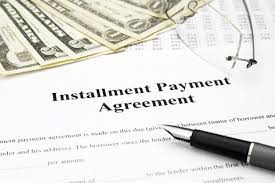When you owe the IRS money, the agency offers a few repayment options to help you settle your debt.
Additional time to pay. If you can’t pay now but are confident you can get that money within the next 60 to 120 days, your best option may be to request a brief extension through the IRS online payment agreement. (https://www.irs.gov/individuals/online-payment-agreement-application).
While you’ll have to pay late penalties and interest for the two or three months, you won’t have to pay the extra fees the IRS charges for setting up longer installment plans. Plus, you’ll save on interest and late fees by settling your account sooner rather than later.
The online payment agreement is designed for individuals who owe less than $50,000 in combined taxes, penalties and interest. You’ll agree to repay your debt in monthly installments over a set course of time, up to six years.
You can set up the online payment agreement here (https://www.irs.gov/individuals/online-payment-agreement-application).
Be prepared to supply your name, email address, home address, date of birth, filing status and your Social Security number. (You’ll need your spouse’s SSN if you filed jointly.)
You’ll also have to tell the IRS how much you’ll be willing to pay back each month. (If you choose a figure that’s too low, the IRS may reject the agreement.) Remember, the sooner you pay off your debt, the less in interest and late penalties you’ll pay.
You will have to pay a user fee to set up your payment agreement. You’ll also have to continue to pay late fees and interest on your remaining tax debt each month.
If you owe more than $50,000, the regular installment agreement might be an option. You’ll need to complete and mail two forms:
- Form 9465, the Installment Agreement Request (https://www.irs.gov/pub/irs-pdf/f9465.pdf)
- Form 433-F, Collection Information Statement (https://www.irs.gov/pub/irs-pdf/f433f.pdf), which is an overview of your finances to help the IRS determine how much you should be able to pay each month.
You will propose a payment schedule to the IRS, and the IRS, after it considers your paperwork, will determine if it accepts your offer or not. Again, if your offer is too low, the IRS will likely reject it and you’ll have to negotiate with them to get to the payment amount they think you can afford.
Late payment penalties and interest will continue to accrue on the balance you owe the government until you pay your debt off entirely.
If you owe more than $50,000, you also have the option of entering into a regular installment agreement with direct debit. There is a setup fee and you’re also more likely to finish paying your tax debt if the IRS takes the money directly from your bank account.
If you’re unsure of which method to choose, or don’t understand how to fill out a form, you can call us immediately for assistance at 720-398-6088!

